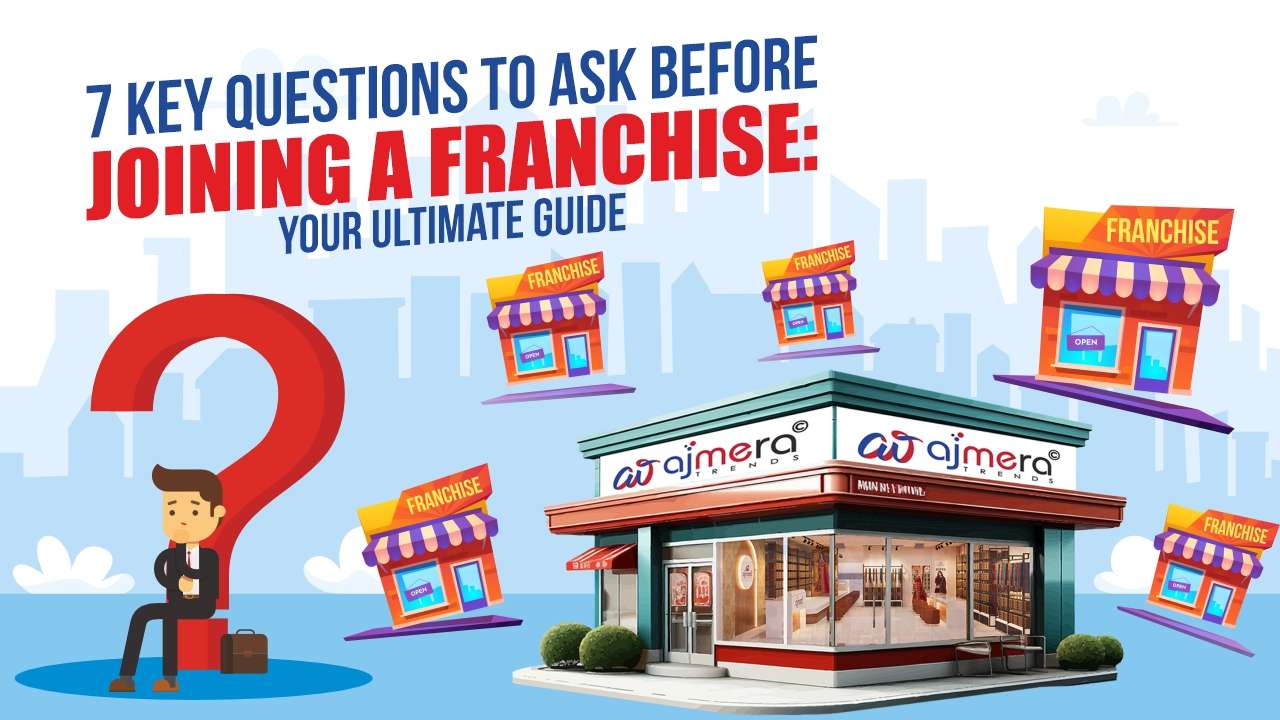7 Key Questions to Ask Before Joining a Franchise: Your Ultimate Guide

Share Blog:
Introduction
Franchises offer a compelling path to business ownership for many aspiring entrepreneurs. The allure lies in the established brand recognition, proven business model, and ongoing support from a franchisor. Imagine stepping into a ready-made system, complete with operational manuals, marketing strategies, and a network of experienced professionals to guide you. Franchises offer a level of structure and support that can be invaluable, especially for those without prior business ownership experience.
However, before moving forward into the world of franchising, it's important to conduct thorough research. This initial investment of time and effort will be far outweighed by the long-term benefits of making an informed decision. By asking the right questions and gathering every piece of information, you can ensure that you're selecting the right franchise opportunity for your skills, interests, and financial goals.
7 Questions to Ask Before Joining a Franchise
Investing in a franchise can be an exciting step towards achieving your entrepreneurial dreams. However, before you sign on the dotted line, it's critical to conduct thorough due diligence. Here are some questions to ask the franchisor, carefully review the Franchise Disclosure Document (FDD), and discuss with existing franchisees to ensure you're making an informed decision:
What is the Initial Investment and Ongoing Costs?
Understanding the financial commitment is paramount. This includes the initial franchise fee, which grants you the right to use the franchisor’s brand and business model. However, it’s essential to consider other costs such as:
-
Startup Costs: Expenses for equipment, inventory, and initial marketing.
-
Ongoing Fees: Royalty fees, advertising fees, and other charges stipulated by the franchisor.
Assess your financial readiness and ensure you have adequate capital not just for the initial investment but also for sustaining operations until your franchise becomes profitable.
What is the Franchise’s Track Record and Reputation?
Research the franchise’s history and its reputation in the market. Key points to consider include:
-
Success Rate: What percentage of franchisees have succeeded versus failed?
-
Brand Reputation: How is the brand perceived by customers and within the industry?
-
Litigation History: Investigate any legal issues the franchise has faced, including lawsuits from franchisees.
Talking to current and former franchisees can provide valuable insights into the franchise's operations and support system.
What Level of Support Does the Franchisor Provide?
The support from the franchisor can significantly impact your success. Key areas to inquire about include:
-
Training Programs: What initial and ongoing training is provided to franchisees?
-
Marketing Support: Does the franchisor offer national and local marketing assistance?
-
Operational Support: Is there ongoing support for operations, technology, and supply chain management?
A franchisor that offers comprehensive support can help you navigate challenges and grow your business more effectively.
What Are the Terms of the Franchise Agreement?
The franchise agreement is a legally binding document that outlines your rights and obligations as a franchisee. Key aspects to review include:
-
Duration of the Agreement: How long does the agreement last, and what are the renewal terms?
-
Territory Rights: Are you granted an exclusive territory, and what are the limitations?
-
Termination and Renewal: Under what circumstances can the agreement be terminated, and what are the conditions for renewal?
It’s advisable to have a lawyer review the agreement to ensure you fully understand the terms and implications.
What is the Earnings Potential?
Understanding the potential return on investment is crucial. Questions to ask include:
-
Average Earnings: What is the average revenue and profit margin for franchisees?
-
Financial Performance Representations: Does the franchisor provide an Item 19 in their Franchise Disclosure Document (FDD), which details financial performance?
-
Break-Even Period: How long does it typically take for franchisees to become profitable?
Having realistic expectations about earnings can help you plan your finances and business strategy effectively.
How is the Current Competitive Market?
Analyzing the competitive environment where you plan to operate is essential. Consider the following:
-
Local Competition: Who are your direct competitors in the area?
-
Market Saturation: Is the market already saturated with similar businesses?
-
Unique Selling Proposition: What differentiates your franchise from competitors?
Knowing the competitive situation in the market will help you strategize better and identify opportunities to stand out in the market.
What is the Exit Strategy?
It's important to consider your long-term plans, including how you can exit the franchise if necessary. Questions include:
-
Resale Rights: Are you allowed to sell your franchise, and under what conditions?
-
Transfer Fees: Are there fees associated with transferring ownership?
-
Buy-Back Clauses: Does the franchisor have the right of first refusal to buy back the franchise?
Having a clear exit strategy ensures you can plan for various future scenarios, whether it's retirement, pursuing other opportunities, or unforeseen circumstances.
Joining a franchise can be an excellent way to become a business owner with a proven business model. However, it requires careful consideration and due diligence. By asking these seven key questions, you can gain understanding of the franchise opportunity and make an informed decision that aligns with your financial goals and personal aspirations.
Evaluating a Franchise Opportunity (Franchise Evaluation Tips)
So you've identified some interesting franchise opportunities. Now comes the important step of thoroughly evaluating each option to determine which one aligns best with your goals and skillset. Here are some key tips to guide you through this process:
Research the Franchise Concept and Target Market
-
Deep Dive into the Industry: Start by researching the industry sector of the franchise you want to concentrate on. Is it a growing market with strong consumer demand? What are the industry trends and potential challenges? Understanding the overall industry and how it works will help you assess the long-term viability of the franchise concept.
-
Analyze the Target Market: Carefully examine the franchise's target audience. Who are their ideal customers? Does their target market align with your interests and understanding of consumer behavior? The better you understand the target market, the more effectively you can prepare your marketing strategies and connect with potential customers.
Talk to Existing Franchisees
-
Seek Diverse Perspectives: Don't just connect with the franchise's "star" performers. Reach out to existing franchisees, both those exceeding expectations and those facing challenges. Talking to a variety of franchisees will provide a well-rounded picture of the realities of ownership and the level of support provided by the franchisor.
-
Ask Candid Questions: Prepare a list of questions to guide your conversations with existing franchisees. Inquire about their overall satisfaction, profitability, challenges encountered, and the level of support received from the franchisor.
Review the Franchise Disclosure Document (FDD) Carefully
The Franchise Disclosure Document (FDD) is a federally mandated document that provides crucial information about the franchise opportunity. It's a dense document, but essential reading for any potential franchisee. Here's what to focus on:
-
Financial Performance: The FDD will include financial statements for the franchisor and may also disclose average revenue and profitability figures for existing franchisees. Review this data carefully to understand the potential financial returns of ownership.
-
Legal Matters: The FDD outlines the legal relationship between the franchisor and franchisee. Pay close attention to the terms of the franchise agreement, including renewal processes, territory restrictions, and termination clauses.
Consult with a Franchise Attorney
The franchise agreement is a complex legal document. Don't hesitate to consult with a franchise attorney experienced in reviewing these agreements. An attorney can help you understand the legalese, identify potential risks, and ensure your rights are protected.
By following these franchise evaluation tips, you'll gain a comprehensive understanding of the opportunity and be well-positioned to make an informed decision about your future as a franchise owner.
Making the Decision: A Franchisee Decision-Making Guide
Choosing the right franchise means finding one that matches your skills, interests, and goals. Make sure the franchise fits what you are good at and what you enjoy doing, so you stay motivated and happy. Think about how much risk you can handle and check your financial situation to see if you can afford the investment and any challenges. Creating a business plan for the franchise is very important. This plan should include research about the market, financial predictions, and marketing ideas specific to the franchise. By thinking about these factors carefully, you can make a smart choice that suits your personal and professional goals, giving you a better chance of success as a franchisee.
Guide to Franchise Ownership
Owning a franchise can be a great opportunity, but it's important to be prepared. By asking the right questions and doing thorough research, you can improve your chances of doing well. It's essential to choose a franchise that matches your skills and interests. Researching the local market helps you find the best place to open your franchise. Marketing is also crucial; even with a small budget, using social media and local partnerships can attract more customers.
Knowing the costs involved, like initial fees and ongoing expenses, is crucial. Look for a franchise that offers good training and support to help you succeed. Asking questions about the franchise's history, the support they offer, and how other franchise owners are doing can help you decide if it's the right choice for you. With careful planning and the right decisions, owning a franchise can lead to success and financial independence.
For Franchisee Enquiry, Call: 6352177288.
Also Read...





